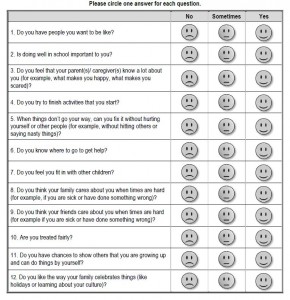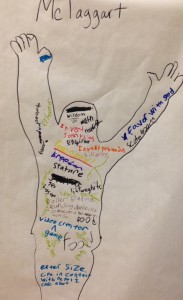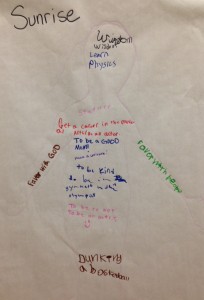Dear friends and church supporters,
I thought it might be of interest to you to see an example of how I am integrating the themes of resilience building, and in particular the measures from the Children and Youth resilience Measure (CYRM-12+4), into our chapel times on campus. What appears below is part of the lesson built around the tried and true measure of resilience: can the child identify skills and abilities that are making them more independent and prepared for the world? We discussed together the fact that Jesus was a child like they were, and there were many things he had to learn before he became an adult. And, if even the perfect son of God had things to learn as a child, how much more should we

A sample of the CRYM and the types of questions the children respond to as a measure of their resilience
realize that there are things we are learning and ways we are growing into the person God is shaping us to be?
This effort to be more purposeful in measuring the effectiveness of the spiritual and cultural aspects of my work with the children is a direct result of my exposure to the nationwide conversation around trauma, adversity in childhood, and the ways that religious communities can be most effective in not only combatting those negative factors in the lives of our nation’s youth, but also the good we can do by intentionally building resilience in young people! If you are interested in learning and growing in these areas and making a positive difference in your community, I’d love to talk with you about the resources and support Intermountain can provide!
Blessings,
Chaplain Chris Haughee
chrish@intermountain.org
Week 3: Knowing & Growing
Resilience Measure Question addressed:
“Do you have chances to show others that you are growing up and can do things by yourself?” (CRYM-11)
Key Bible passages:
- Jesus “grew in wisdom and stature, and in favor with God and all the people” (Luke 2:52). It is also likely that Jesus learned carpentry from his earthly dad! (Mark 6:3)
- Jesus showed a heart for learning and applying God’s Word to his life (Luke 2:41-52).
Outcomes:
- Students will identify three ways they are growing up and learning healthy independence.
- Students will identify and write down three things they are good at.
Object lesson or activity: “Body Building”
[have the following items gathered together: large sheets of butcher paper, big enough to draw an outline of one of the children; markers to write on paper]
Hi boys and girls. Today we are going to be looking at a story from the Bible that talks about Jesus as a child. We don’t really know a whole lot from when Jesus was a kid, but we do know that as he grew up he would have learned from his parents what it would mean to be an adult. I am wondering… what do you think it means to be “grown up?”
[children respond]
Those are all interesting ideas! Being a “grown up” can mean a lot of different things. Luke 2:52 says that Jesus grew up in a few different ways…
He grew “in wisdom.” Wisdom is taking what you know and applying it to real life. You are wise if the things you learn in school and chapel and the cottage help you handle future problems, difficulties and opportunities better than you would have without that knowledge. Make sense? Here’s an example… you can learn math in order to do well on math tests. That is growing smarter in math. But it becomes wisdom when you use your math skills to build a house or search for the best deal on the groceries you buy.
He grew “in stature.” That means he got taller and bigger. How many of you are bigger than you were last year at this time? How many will get bigger by the time you are an adult? What things are you hoping to do when you “grow in stature” and become an adult?
[children respond]
Lastly, Jesus grew in “favor with God and man/people.” Do you know what it means to “gain favor” with someone? It doesn’t mean you become that person’s favorite, though the words are similar. It means that you leave that person with a “favorable” impression. You cause them to think you are a pretty neat girl or boy. Now, we might suppose that it would be easy for Jesus to grow in favor with God and man, because—after all—Jesus was God’s son, without sin. Jesus always did what was the good and right and just thing to do.
But, do you suppose, just maybe, that even if you always do the good and right and just thing in every circumstance that perhaps not everyone is going to appreciate that? I think you can imagine that there might be people who don’t want to be around people like that… sometimes those who appear to be perfect are hard to be around. So, Jesus must have had a very special way of being good and just. He wasn’t right and looking for ways to prove others wrong. No, if he was that sort of boy, I don’t think he could have grown “in favor with God and man.” I think Jesus was the type of boy and young man that others wanted to be around because they admired not only the way in which he behaved, but how he made others feel comfortable around him, appreciating them just as they were and seeing the best in them.
Now, we’re going to do an activity in small groups of three or four. Someone in the group will need to lie down on the piece of butcher paper I give the group while the others carefully trace the shape of their body. After you do that as a group, I’ll give further instructions.

Click to see what the children in McTaggart Cottage came up with as ways that they are “Knowing and Growing!”
[divide the group into smaller groups of three or four each, pass out butcher paper sheets and markers. Let children complete the first set of instructions]
Now that you have your outline of a person, I want you to write the following on your paper:
- By the head, write WISDOM
- On the body, around the chest or tummy, write STATURE
- On the arms, because with our arms we shake hands and give hugs, write FAVOR WITH GOD and FAVOR WITH PEOPLE, each phrase on a different arm.
[give children time to complete that portion of the instructions]
Finally, discuss as a group, and take turns with each of you writing ways you can see yourself growing up in each of these ways.
- For WISDOM, write down the things you want to learn more about and the ways you can think about other people and the world that would make you a wise person (examples: learn how to drive a car, learn how to bake, think of people I don’t know as friends I have yet to make acquaintance with, etc.)
- For STATURE, write down things you hope to do when you are bigger, taller, stronger and more able. (examples: dunk a basketball, reach the top of the shelves, play football, become a mom or dad, etc.)
- For FAVOR WITH GOD, write down ways that you are learning about God and finding out about what God hopes for you and your life. (examples: being kind, generous, loving others, etc.)
- For FAVOR WITH PEOPLE, write down ways that you are learning to treat others with respect and how you are making friends. (examples: showing respect, sharing, looking for ways to include everyone in the group)
I’ll be coming around to each group to see how you are doing. If there is time when our groups are done, we’ll share with one another what we came up with, okay?

Click to see what the children in Sunrise Cottage came up with as ways that they are “Knowing and Growing!”
[give children time to write ideas and decorate their butcher paper outline of a person]
Now that we’ve had a chance to think about how we are growing up just as Jesus did, I’d like you to pause and write some of what you have learned in your handbooks as we discuss three questions to wrap up this activity.
[ask kids to grab their handbooks and turn to the “what I learned” page for lesson 3. They can write in their answers as you discuss.]
Discuss:
- How would you describe Jesus as a boy? How does the Bible describe the way Jesus was showing others that he was becoming more mature and grown up?
- What are three things you do well that show you are growing up and becoming more responsible and wise?
- What might you still need to learn in order to become a healthy, independent adult? If you look in your handbook, you’ll see some ideas if you get stuck! After you select three things you are still learning, write down how you might learn those things and who could teach you.

 Click here to subscribe to our RSS feed with your favorite email client and be alerted to new articles.
Click here to subscribe to our RSS feed with your favorite email client and be alerted to new articles.